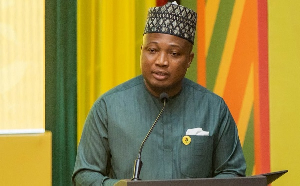…Under the Guise of Intellectual Debate
By Dr Alfred B Cudjoe
Ghana’s democracy stinks, and the more you get closer to it, the more offensive the stench. Our multiparty democratic system is comparable to the sea. Viewed from a distance, it looks still and beautifully blue. As you approach it you’ll notice a number of things, not visible from afar – there are movements; the colour is not only blue, it is also grey; there are all kinds of objects in it, apart from fish. Getting closer to Ghana’s democratic system does not make it look as attractive as one would think from a distance. One of the developments which threaten to take the spark out of our otherwise attractive system of government, by African standard, is what has become known as ‘serial calling’. By it, over-zealous party activists call in to radio stations to shower praises on political parties that they think they support and demonise their opposition counterparts. It is an unpleasant game that no reasonable citizen enjoys.
While serial callers are at their game those who can be referred to here as ‘serial writers’ would not allow themselves to be left out. They usually don’t find much space in the print media but the Internet has provided them with a free platform to do a lot of shadow boxing. One wonders who pays them for the rubbish they write, but like the believer who thinks he or she will go to haven one day, they hope their efforts will be rewarded in the near or distant future.
Thus the NDC dirty propaganda has swung into fool gear with these zealous serial callers and writers rallying to jam discussions on the merits and demerits of abolishing the research and book allowance being paid to lecturers. The government is proposing the scrapping of the allowance so that it can be replaced by a yet to be well defined research fund. Apart from the government claiming that the change will ensure that funding meant for research is used for its intended purpose, no convincing argument is being advanced to justify the scrapping of the allowance.
Akwasi Ayanful’s article with the title “The Bogus Research Fund” (Ghanaweb, 8 August 2014) rather provides some hint about the government’s intentions which nobody is talking about. Among other reasons, the government is taking the unilateral decision because “by upgrading teacher training colleges to tertiary institutions, the teaching staff will become lecturers and will be entitled to the research and book allowance. Since the Government wants to ‘create new universities’ but doesn’t want to pay the new lecturers, they are using the establishment of the National Research fund as cover-up.”
But what lecturers are not happy about is the refusal to pay already outstanding allowances and the fact that the proposed research fund is not yet operational. Not only that. No proper consultation with lecturers was done, no education on the yet to be established fund. The action by the government is being carried out with no regard for due process and taking lecturers for a ride.
Lecturers have maintained that the research and book allowance is one of their working conditions. Indeed, lecturers are employed not only to teach but also to carry out research. Any lecturer who fails to do so over a certain period is liable to be fired by their employer. Unknown to many people, including those who are making so much noise in this debate, lecturers are not permanent employees but temporal ones whose contracts can only be renewed after stated periods. And that will depend on proving oneself in all areas, including research.
The government can therefore not claim that allowances paid in respect of carrying out research are not being used for their intended purposes when there are laid down procedures for checking this. One also finds it difficult to see the merits of some the arguments being advanced by some writers in sympathy with the government’s action.
For example, in his article entitled “The POTAG Strike Exposes Flaws in Our Democracy” (Ghanaweb 11 August 2014), Bokor gives some reasons why, in his estimation, the government is right in scrapping the research and book allowance. It is good to caution Bokor and others who operate on the same wavelength (see, for instance, Andy C Y Kwawukume, Ghanaweb 13/08/2014) that looking at certain issues through a political lens does not help. If you are not careful in the end you will be making sense only to yourself. For example, Bokor states “We know that the "book and research allowance" has turned out to be an additional "earned income credit" for the lecturers in POTAG/UTAG.” Such a claim, apart from being sweeping, diverts attention from pertinent issues that are cropping up in the discussion of the scrapping of the allowance and the controversial proposal of a research fund. Can Bokor and Kwawukume prove their claim? Even if they can they will only be confirming an unfortunate fact about lecturers – that their salary is so inadequate that they have to live on money they have been paid to carry out research.
Supposing still that Bokor’s allegation is true, who made him judge over the lecturers? Why can’t the person also make him judge over the way other allowances are used? In Ayanful’s article quoted above, he states: “Why limit it to the Universities and Polytechnics who by the way enjoy the least service conditions compared to their counterparts at the Ministries with lesser degrees and who also require more for promotion comparatively. Parliamentarians take huge sums as ex-gratia, even those who have been re-elected. Ministers and deputy ministers have allowances such as duty, special, entertainment, wardrobe, free accommodation, chauffer, cook, garden boy, watchman, steward etc.”
So far the government has not provided any assurance to lecturers that its proposal to introduce a research fund is well-intentioned and arguments like those by Bokor and co also reinforce that fact. The claim that the establishment of a national research fund “will instil discipline, rigour, and accountability into the allocation of public funds” is just a recitation of empty political slogans. In dealing with lecturers who are shaping the future of our youth, such wordy phrases do not help anybody. On this score some of the questions raised in Ayanful’s article are worth pondering over: “How many lecturers do we have in the Universities, Polytechnics and the Teacher Training Colleges put together who qualify to write which category of proposals. Will the disbursal of the so called 15 million be enough for the most basic research for awardees? What will be the monitoring methods and what happens next year when there is no money as we have seen with GETFUND, District Assemblies, NHIS etc. “
This discussion does not intend to argue with anybody on political grounds. Rather it aims at bringing out certain facts that need not be swallowed by unnecessary politicisation of pertinent issues. One of them is that no lecturer is happy to get involved in protracted strikes. I am sure POTAG members are itching to resume lectures. Also it needs to be made known that, lecturers, especially duty conscious ones, never sit down with folded arms, even when they are on strike. There is so much work on a lecturer that such times are used to clear the backlog of work – marking of project work, writing journal articles, preparing for the academic year, and so forth – that have piled on them. Viewed from this background the suggestion by Brig. Gen. Nunoo-Mensah (rtd) that the government suspend salaries of striking lectures is controversial as the government’s proposal to introduce that research fund. One can only see the General’s utterance as one of those made by people who think by doing so people will start taking them more seriously.
Now let’s face a fact. I read a rather crude comment made by a reader on Bokor’s article under reference: “Two useless Ewe idiot (sic), Andy-K and Bokor kissing themselves (sic)”. When you live in a glass house, why do you have to throw stones? The impression is being created that there is a particular part of Ghana that nobody, including the educated, sees anything wrong with any policy of the government. Such an analogy gives rise to the belief among some people that even a dog can win elections in the Volta Region so long as it is in NDC colours. Ridiculous as these statements sound, they turn to gain currency when people with typical Ewe names make lame arguments devoid of all common sense such as we come across on the Internet.
In my humble opinion intellectuals will be doing themselves a lot service if, in their debates, they base their arguments on proven facts, and make sense even to the doubting Thomases. This country of ours has become so polarised politically and tribally that you will have yourself to blame when you are given names because you align yourself so fanatically to a political party and at same claim to be making an impartial debate on a platform such as the one we now find ourselves. Since you cannot have your cake and eat it, such an act only leads to the selling of your intellectual birth right.
Opinions of Friday, 15 August 2014
Columnist: Cudjoe, Alfred B














